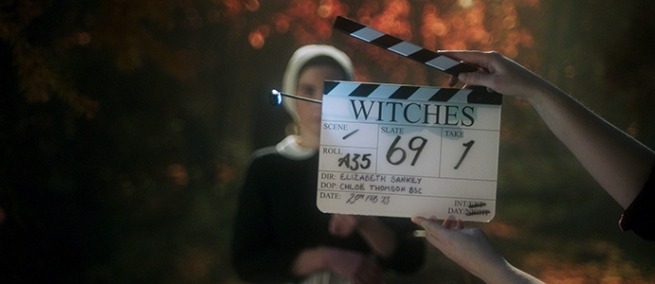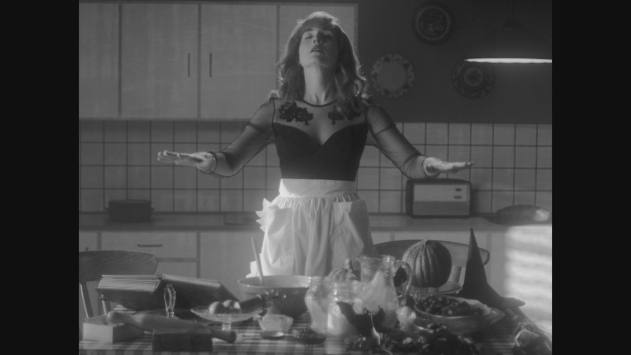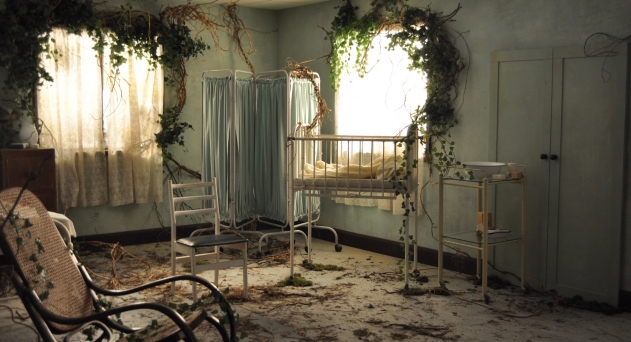
Filmmaker, writer, and musician Elizabeth Sankey’s new documentary WITCHES explores postpartum mental health issues—particularly postpartum psychosis—through the lens of the filmmaker’s own experience, as well as the depiction of women as witches throughout cinematic history. The film is now available globally on MUBI. We spoke with Sankey from her home in London about the stigma against women and mental health, her approach to the subject, and the responses she’s gotten to the film so far.
Science & Film: What is your connection to witches?
Elizabeth Sankey: It kind of always was there. From the beginning, I'd always loved witches, and I'd always wanted to make something about witches. I'd done an essay film called ROMANTIC COMEDY, about romantic comedies, so I sort of knew what a bit of what I was doing there [with archival research]. And then, when I had my experience, my illness, it had really felt very witchy. I had felt like I was in a horror film, and that I was a bad mother and a bad woman. So it felt very natural to tie in the witches and then as well, the fact that, historically, the witch is such a potent and kind of important symbol for women, and is something that the patriarchy wants us to be scared of. We don't want to be a witch, you don't want to be a hag. You don't want to be a crone. But I think for so many women, she is a figure that we find very empowering and exciting and appealing. And so I also knew that it would be a way to make my experience more palatable, and it would be a sort of shorthand. Other women could be like, maybe we're not just mad--well, we are--but also maybe we're witches. That would be nice, wouldn't it?

Courtesy of MUBI
S&F: The witch has a kind of potency, and I can imagine an experience like the one yet went through can also be very disempowering...
ES: Everyone was saying to me, you've got to work out what kind of mother you want to be. I just couldn't see any examples of mothers in popular culture that I felt like, oh, that's the kind of mother I want to be. And then watching loads of films about witches, I was like, that seems a really resonant, that really works.Eespecially because you're growing a human being inside your body, that is the most amazing, witchy, bizarre thing. I remember feeling like, how can this be happening in a world where, for example, Trump exists? This is something that is so beyond reality, and what we've been taught that reality is. This just felt like, okay, maybe I can find a different way to see myself as a mother and to move through the world as a mother. Witches felt like a really, really good option.
S&F: In terms of some of the other voices you bring into the film, I'm thinking not only about your peers, but some of the folks who are speaking to the clinical experience—how did you think about balancing that information with the more personal?
ES: Yeah, that really hard actually. We did also interview–and then we had to cut them because it just wasn't working in terms of focusing on the narrative of like a three act structure–but we also interviewed these three women who had who worked at Edinburgh Napier University. They’ve studied the Scottish witch trials and found so many similarities between their work as midwives and nurses and the work of the women who were killed during the Scottish witch trials. And they saw so many practices that they would still do today, that these women were doing all of those years ago. There was so much about it that was so fascinating to me. I had found this academic paper by Professor Louise Jackson, and she had written about these unexplained cases of voluntary confession in England. And again, that was so interesting to me, because I could see so many of the women who were doing that had similar symptoms to mine.
There was so much historical stuff. That was the part of it that I found really, really fascinating, and wanted to weave more of into the film. And I think you could make a whole other film more about that. It was a very delicate balance of tying together what are really three threads: historical witch trials and European witch trials, and my story and the story of postpartum mental health illness, and then the depiction of women and witches in cinema. So it was kind of like having to hold those threads really tightly, but there's so much more to explore.

Courtesy of MUBI
S&F: In terms of the more the mental health aspect, and what you discuss in the film about the experiences and testimonials of women being ignored in clinical settings, and women not being seen as reliable narrators, can you talk a little bit about that as it relates to what you wanted to do with this film?
ES: I contacted so many different women from so many different backgrounds and experiences, including women who I knew had gone through some experiences similar to mine, who had talked about it, written about it, and it was really hard, because so many women just didn't want to say what had happened to them, and didn't want to talk about it on camera, which I totally understand. But the stigma is so silencing for so many women, and we really saw that.
Even in the film, doctor Trudi Seneviratne, who is this incredible doctor who is one of the leading medical practitioners in the UK for these illnesses, who has saved so many lives at the mother and baby unit where she works, has petitioned the government for more funding, and has got it. Even she, when she had postpartum psychosis, she wasn't believed at the hospital, and then felt this immense stigma about talking about it publicly. I really saw that as a white, privileged woman who speaks English as her first language, even I struggled to get help, and even I struggled to be understood and to be taken seriously. When you realize that, you think, gosh, you know, that's why the maternal mortality rates for non-white women are so high, and it's so bad. With the film we really wanted to try and address that, but a lot of women didn't want to be on camera, I completely understand why. It's a really, really hard thing to talk about.
All of the women in the film are women who have either used their experience in mother and baby units, or from their psychiatric illness, they've used it in their work. They're comfortable talking about it, or they're medical professionals, or they're women in the support group, Motherly Love, where I was a member and still am a member, and where they looked after me. They really believe in the importance of telling their stories. Others are women who were on the ward with me, and who had gone through the experience with me, and so it was our story together. I know that people will be frustrated and sad that there's not more diversity in terms of the women that we interviewed, but it's really, really hard to talk about this stuff.
S&F: How has the audience reaction been at festivals so far?
ES: The responses have been really interesting. When people didn't really know what the film was, I think there were some people who were a bit upset because they had thought it would just be a documentary about witches, and we didn't want to, like, hoodwink anyone, but I definitely felt like at some of the screenings, people were quite upset, obviously, and also found it quite uncomfortable. And then as the film's gone on, and it's kind of finding its audience, the Q and A's, the responses have just been so lovely and so warm, and we've had so many wonderful questions, and people sharing so many stories. Tragically, so many people who have said to me, I lost someone to one of these illnesses. That's a very, very common occurrence now, which just drives home for me the urgency of the film getting out there, and of people feeling like they can talk about this stuff and get help, and people learning more about it.
♦
TOPICS